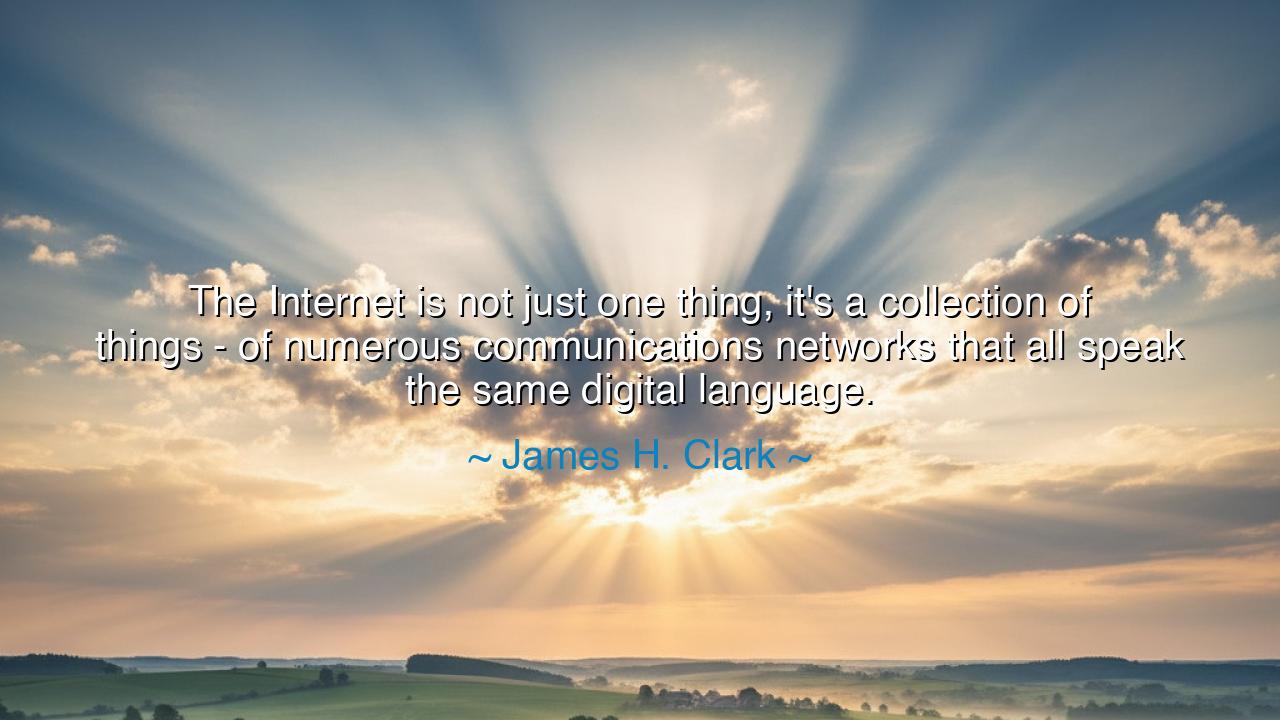
The Internet is not just one thing, it's a collection of things -
The Internet is not just one thing, it's a collection of things - of numerous communications networks that all speak the same digital language.






James H. Clark’s words, “The Internet is not just one thing, it’s a collection of things - of numerous communications networks that all speak the same digital language,” are a profound reflection on the essence of the Internet—an intricate tapestry woven together by countless threads of communication and connection. In this statement, Clark captures the true nature of the Internet, not as a singular entity, but as a dynamic and multi-faceted system, where various networks and systems interconnect to form a unified whole. The digital language that binds these networks together is not just a code but a universal means of connection, bridging gaps and transcending boundaries, creating a space where people from all walks of life can share, learn, and grow.
To understand the depth of Clark’s words, one must think back to the ancient world, when the great philosophers and scientists sought to understand the world not as isolated parts, but as a connected whole. In ancient Greece, thinkers like Heraclitus saw the world as a constant state of flux, where everything was in motion and interconnected. He famously declared that, “You cannot step into the same river twice,” meaning that everything, like a river, is always changing, flowing, and interacting. Similarly, the Internet is a system that evolves, with countless interconnected elements flowing into one another, creating an ever-changing, dynamic whole.
This idea of interconnectedness also resonates with the teachings of Confucius, who believed that the strength of a society lay in the interdependence of its people. The Internet, in its essence, is a modern reflection of this ancient wisdom—a vast network of communication and relationships, all connected by a common thread. Just as Confucius stressed the importance of harmony in society, so too does the Internet rely on harmony between its networks, allowing for a smooth and cohesive exchange of information. Clark’s quote is a reminder that the power of the Internet lies not in its individual parts, but in the way these parts come together, each contributing to the greater whole.
To see the truth of Clark’s statement, one need only look at the way the Internet has evolved over the past few decades. The creation of ARPANET, the precursor to the modern Internet, marked a significant turning point in human history. Initially designed as a military communication network, it quickly expanded to include universities, research institutions, and eventually the broader public. Over time, numerous networks—from social media platforms to search engines, from financial systems to educational tools—joined this vast digital ecosystem. Each of these networks speaks a different language, yet all communicate in the same digital code, creating a unified structure that connects billions of people around the world.
The Internet, as Clark describes, is not a monolithic entity but a living, breathing organism made up of various interconnected systems. Just as the ancient Romans built an empire by connecting distant territories through a vast system of roads and communication channels, so too has the Internet created a modern empire of knowledge and connection. The Romans understood that their empire’s strength lay not in the individual territories, but in the network that bound them together. The same holds true for the Internet—its true power lies not in individual platforms or systems, but in how these elements come together to create a unified and interactive whole.
Yet, Clark’s quote also serves as a reminder of the fragility of this interconnectedness. While the Internet offers immense potential for communication and growth, it also brings with it risks—misinformation, cyber threats, and disruptions to the very networks that keep it functioning. The ancients, too, understood that progress must be tempered with wisdom and caution. The Greeks warned of the dangers of hubris—of believing that we can control forces larger than ourselves. Similarly, in our digital age, we must remain vigilant and responsible in how we engage with the Internet. Just as a single break in the Roman road network could disrupt communication across an entire empire, so too can a failure in our digital systems have far-reaching consequences.
Lesson for the ages:
The Internet, like the world itself, is an interconnected web, where every element plays a crucial role in the greater whole. Just as the ancients saw the universe as a harmonious system where each part contributed to the greater order, we must view the Internet not as a collection of isolated tools but as a dynamic ecosystem in which every network, every communication, and every interaction plays a part in shaping the future. To truly harness its potential, we must respect its complexity and use it responsibly, understanding that its power lies not in any single part but in the way it connects and enables.
Practical Action:
As you navigate the vast digital landscape, remember the lesson of Clark’s words. Understand that the Internet is a living, evolving system of connections—one that requires thoughtful and responsible interaction. Just as the ancients valued the interconnectedness of society and the world, so too must we value the interconnectedness of our digital world. Use the Internet not as a tool for isolation, but as a means to connect, to collaborate, and to share knowledge in ways that build a better, more harmonious world. Be mindful of the way your actions ripple through this vast network, and ensure that you are contributing to its greater good.






AAdministratorAdministrator
Welcome, honored guests. Please leave a comment, we will respond soon